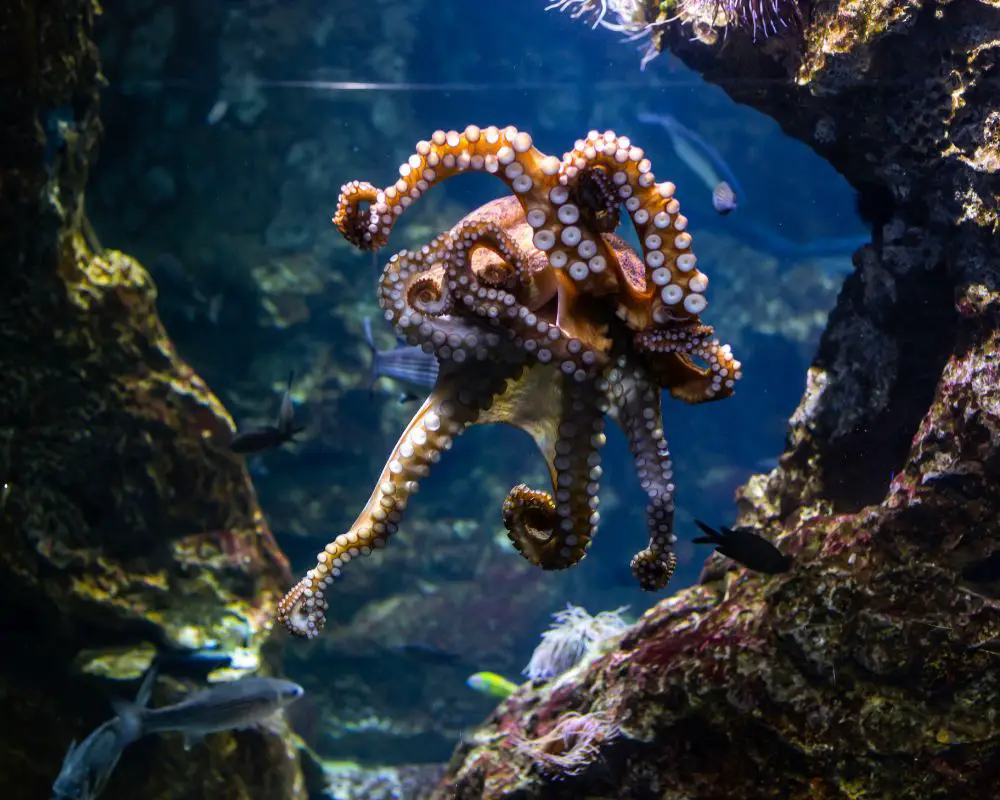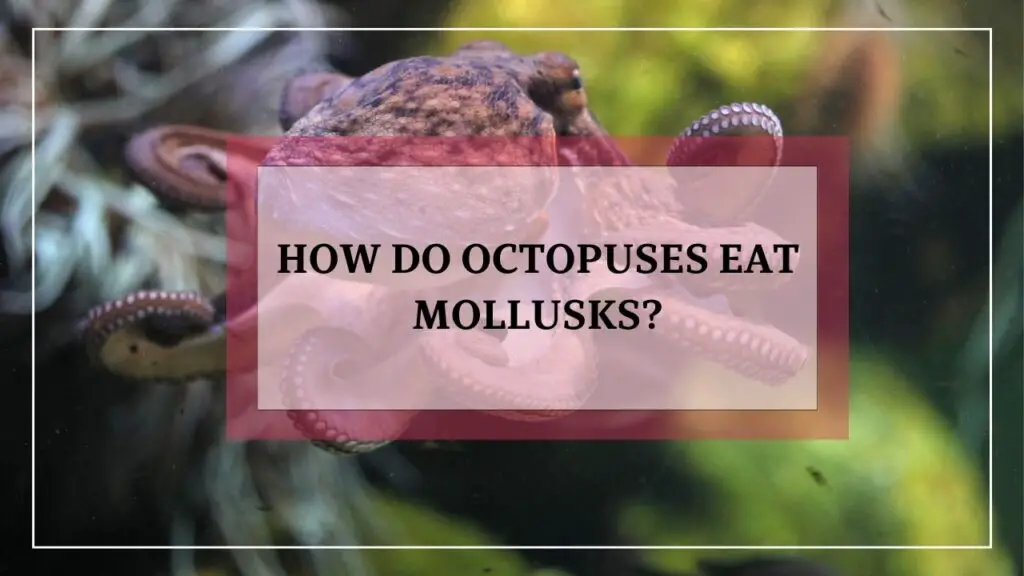Have you ever wondered how octopuses eat their favorite meals, like clams and snails? Well, get ready to dive into the fascinating world of octopuses and their unique feeding habits!
Octopuses are incredible creatures that live in the deep, mysterious ocean. They have special body parts called tentacles that help them catch and eat their food. But what do they like to eat the most? It turns out, octopuses have a taste for mollusks, which are slimy and shell-covered creatures like clams, mussels, and snails.
In this blog post, we’re going to learn all about how octopuses hunt and devour their mollusk prey. We’ll discover the clever tricks and special tools they use to catch and eat their food.
In short, Octopuses use their tentacles and powerful suction to catch and consume mollusks. They may use their beak to create an opening in the mollusk’s shell, allowing them to insert their tentacles and extract the soft tissues inside. Octopuses can also break apart the shells of larger mollusks to facilitate consumption.
Their advanced digestive enzymes and efficient nutrient absorption ensure they make the most out of their mollusk meals, gaining protein, minerals, and omega-3 fatty acids for their health and well-being.
So, get ready to explore the underwater world of octopuses and get into the details of their dining adventures! Let’s dive right in!
Types of Mollusks Octopuses Prefer:

These creatures come in all sorts of shapes, sizes, and textures. Let’s dive in and explore the diversity of mollusks and why octopuses can’t resist them.
The Mollusk Crew
Picture this: a bustling underwater party with clams, mussels, snails, and even crabs as the special guests. Octopuses love to have a feast on these delicious critters! But what makes these mollusks so appetizing to our cephalopod friends?
Clams: Shells Full Of Goodness
First up on our mollusk menu are clams. These little guys may look like ordinary seashells, but inside, they hide a soft and scrumptious treat that octopuses can’t resist. Clams are like treasure chests packed with nutrients, such as protein and minerals. Octopuses can easily pry open their shells and indulge in the tasty goodness.
Mussels: Nature’s Sea Snacks
Next on the list are mussels, the go-to snacks for octopuses in the oceanic pantry. These little bivalves attach themselves to rocks, forming large groups called “beds.” Octopuses love to sneak up and snatch them away, savoring their rich flavors and high protein content. Mussels are like bite-sized energy packets for our eight-armed friends![1]
Snails: Slow But Delicious
Moving along, we have snails, the slowpokes of the mollusk crew. These shelled buddies may take their time, but octopuses have a knack for catching them off guard. Snails offer a delightful combination of chewy textures and flavors that tickle the taste buds of our cephalopod pals. Plus, they’re a great source of calcium, helping octopuses keep their shells strong and healthy.
Crabs: A Shellfish Delight
Last but not least, we have crabs joining the mollusk party! While not technically mollusks themselves, crabs are often part of the menu for octopuses. With their hard exoskeletons and meaty interiors, crabs provide a challenging yet rewarding feast for our cunning cephalopod friends. It’s like cracking open a puzzle box filled with delicious surprises!
What’s The Catch?
So, why do octopuses have such a soft spot for mollusks? Well, my friend, it’s all about accessibility and nutritional value. Mollusks are abundant in the ocean, making them easy prey for octopuses. And not only are they readily available, but they also offer a fantastic nutritional package. Octopuses get a good dose of protein, minerals, and even omega-3 fatty acids from these tasty treats.
How Exactly Does Octopus Eat Mollusks?
These cunning creatures have some seriously cool moves when it comes to enjoying their mollusk meals.
Suction, Swallowing, And Regurgitation
Octopuses have mastered the art of suction, and they put it to good use during mealtime. They use their muscular arms to create a powerful vacuum, firmly attaching themselves to the mollusk’s shell. Once they’ve secured their grip, they employ a suction force that allows them to draw out the soft tissues inside the shell.
But wait, there’s more! Octopuses can also swallow their food whole. Picture this: our clever cephalopod friend creates a little opening in the mollusk’s shell using their sharp beak. Then, with the help of their amazing tentacles, they skillfully extract the scrumptious insides of the mollusk. It’s like a gourmet feast in one swift move!
Breaking Shells And Sharing Delights
Sometimes, octopuses like to shake things up a bit, especially when faced with larger mollusk shells. In these cases, they employ their incredible strength and agility to crack the shell into smaller, more manageable pieces. It’s like an underwater version of breaking open a treasure chest!
Once they’ve dismantled the shell, octopuses can indulge in their meal piece by piece, savoring every morsel. And hey, they might even be generous enough to share their tasty treats with their friends nearby. After all, sharing is caring, even in the deep sea!
The Art Of Octopus Dining
So, octopuses have a repertoire of impressive dining techniques. From suctioning and swallowing to shell-breaking, they’ve got it all figured out. It’s like watching a master chef create a culinary masterpiece!
Digestion and Nutritional Benefits Of Mollusks
Alright, let’s dive deep into the fascinating world of octopus digestion! These marvelous creatures have some seriously impressive digestive systems that allow them to make the most out of their mollusk meals.
Advanced Digestive Enzymes And Nutrient Absorption
Octopuses have a secret weapon when it comes to digestion: their advanced digestive enzymes. These powerful little molecules break down the proteins, fats, and carbohydrates found in their food, transforming them into smaller, more easily absorbable nutrients.
Once the food is broken down, octopuses have a highly efficient nutrient absorption system. Their body is lined with a special layer called the epithelium, which acts like a super-absorbent sponge, soaking up all the precious nutrients from their meals. It’s like having a state-of-the-art nutrient extraction factory inside their bodies!
Nutritional Bonanza From Mollusk Meals
Now, let’s talk about the amazing nutritional benefits that octopuses derive from their mollusk feasts. Mollusks are like little nutrient powerhouses, offering a wide array of goodies that fuel our eight-armed friends.
First and foremost, mollusks are packed with protein, which is like the building blocks for strong muscles and tissues. Octopuses need plenty of protein to stay active and agile in their watery world. But that’s not all! Mollusks also provide important minerals like calcium, iron, and zinc, which are vital for maintaining overall health and well-being.
And here’s an exciting bonus: mollusks contain omega-3 fatty acids, which are like little superheroes for the brain and heart. These fatty acids help keep our cephalopod buddies sharp and healthy, ensuring they can navigate their underwater playground with ease.
A Menu For Health And Happiness
It’s clear that a diverse diet is key to the overall health and well-being of our octopus pals. By consuming a variety of mollusks, they gain access to a range of essential nutrients that support their growth and vitality.
Just like humans, octopuses need a balanced diet to thrive. Mollusks provide them with the necessary proteins, minerals, and omega-3 fatty acids to keep their bodies in top shape. So, the next time you see an octopus enjoying a mollusk meal, remember that they’re not only satisfying their taste buds but also nourishing their bodies for a life full of underwater adventures.
Conclusion
In conclusion, dear marine enthusiasts, we’ve delved into the mesmerizing world of octopuses and their remarkable way of devouring mollusks.
From their preference for clams, mussels, snails, and even crabs to their clever consumption techniques and advanced digestive systems, octopuses have truly mastered the art of underwater dining.
These intelligent creatures reap the nutritional benefits of their mollusk meals, fueling their health and happiness.

